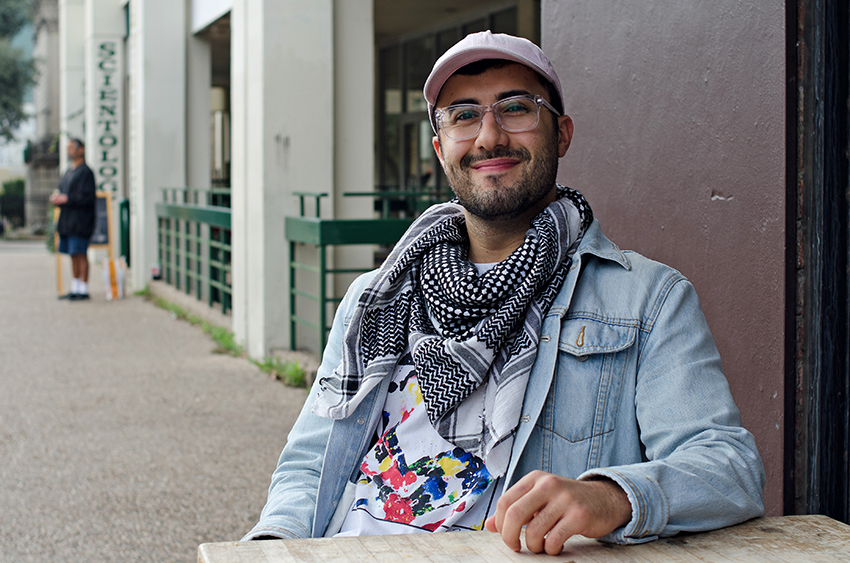A dimly-lit stage, a series of finger-snaps and the echo of a single powerful voice dominating the room. All eyes now focus on Adam Hamze, a Lebanese-American college student donning a traditional Arab keffiyeh and clear-rimmed frames.
Hamze, an International relations and Middle Eastern studies senior, writes, performs and competes in slam poetry. Hamze has written poetry since high school and uses his poems to connect to his Arab heritage and defy stereotypes about his culture. Hamze said when he first began writing poetry, he was initially inspired by rappers like Mos Def and Lupe Fiasco.
“They are all conscious hip-hop and very focused on lyricism and social justice,” Hamze said. “That kind of put a mindset in my head of using words and lyrics to address these topics.”
Hamze began working and competing formally, using incidents of racism and discrimination he experienced throughout his life as inspiration.
“The biggest reason of why I got in poetry had to do with Islamophobia,” said Hamze. “I was getting jumped in middle school everyday, so I began to assimilate as a defense mechanism, but once I started doing poetry I was introduced to people of color who were proud of being minorities.”
Hamze said his generation has had to deal with a long legacy of extreme prejudice and oppression dating back to the days of the Ottoman Empire to modern instabilities plaguing the Middle East.
“For a lot of Arabs, we are the products of what our parents survived,” Hamze said. “My parents escaped a civil war, and now our fight continues here.”
Wanting to bring his platform to a wider audience, Hamze started Googling places in Austin at which he could perform. He began performing with They Speak Austin in high school. As his craft grew, Hamze moved onto larger competitions. Last year, Hamze performed one of his pieces at the College Unions Poetry Slam Invitational. There, he performed “Sequence,” a piece which focuses on society’s negative stigma toward Syrian refugees.
“As an Arab-Muslim poet, I don’t want to have to explain to people my own humanity,” Hamze said. “But I do think a lot of people don’t know what is to be an Arab or a Muslim in America.”
Hamze thinks the two most important aspects of writing poetry are self-healing and creating representation.
“When something is hurting you and you put it on a page it becomes a tangible thing,” Hamze said. “Once that exists you can try to dissect and understand it better. You are creating the representation that people need. When people watch Hollywood and other media, they want to see people that look like them and see their stories reflected.”
Rimsha Syed, a biology sophomore, discovered Hamze’s poetry through Twitter last year. She said Hamze’s words are very relatable and allow her to relate her own experiences to his work.
“His passion to stand up for what he believes in and express himself artistically shines through his writing in a way that makes you want to read on,” Syed said.
Hamze said one of the most important aspects of poetry for him is the community centered around it.
“I couldn’t be one of those poets who sat alone in a room working on lines,” Hamze said. “It is all about the community for me.”
But Hamze said he ultimately hopes to inspire the next generation of poets at UT through his work.
“My bigger focus is giving the new poets what I was given when I started,” Hamze said. “That is how revolution is made, by people willing to put effort and sacrifice back into the community.”














